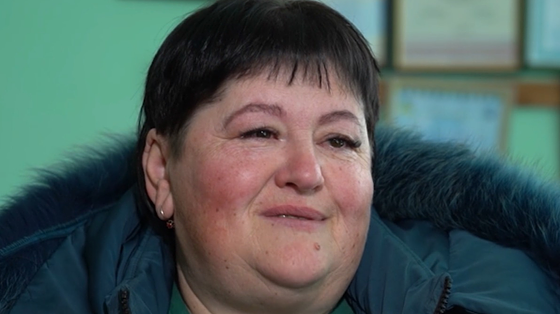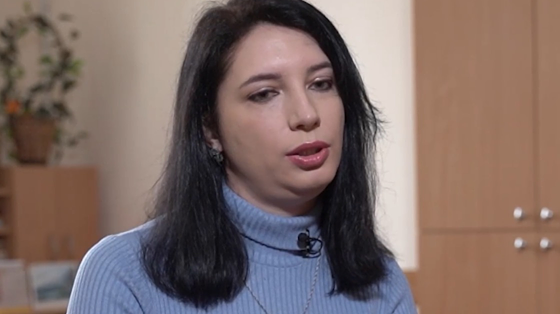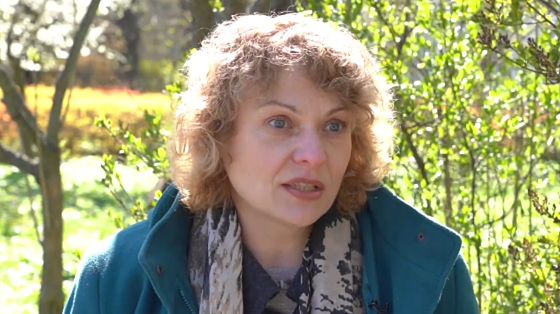She was lucky to survive in the tragedy at the Mariupol Drama Theatre. Since the beginning of March, Vira Lebedynska, the head of the music department, was hiding there in her own semi-basement office.
The theatre was a shelter for more than a thousand residents of Mariupol. Until the Russian invaders deliberately dropped an aerial bomb on it...
I ran to the Mariupol Theatre on 3 or 4 March. I don’t remember exactly as my house had already been hit [by shellfire]. The fourth and fifth floors were on fire and the window glass was shattered. It was near me. I lived in the city centre, two stops from the theatre, the so-called “Tysiachka”, and the centre for public administrative services located there was hit [by fire], that building was struck. So I realized that it was dangerous for me, and for some reason I wanted to go to the theatre so much. I thought that I would find my rescue there. I had such a feeling, and so I ran there. Oksana Semochka and her husband were already there. They had fled from Skhidnyi city district. They had a car but they could not leave Mariupol because there was no car fuel. No one had anything. So they parked their car near the theatre, and they settled in my office.
My office was in the semi-basement, and I was staying there with them. There were four of us and then our security guard and his family also joined us – there were six people there then. We lived there until 16 March. As for how we lived...
Oksana and I took on the duties of cleaners. We made the cleaning because there were up to a thousand people, and we had to take care about it. The theatre was not designed to accommodate so many people. We also cleaned the toilets, tidied up the premises and swept the floors.
Well, we did what we could. People somehow self-organized, and they, our lighting operator Yevheniya, she was kind of a superintendent there. Well, we cannot call it a bomb shelter. It was rather some basement premise where about 60 people were accommodated. They already knew what to do there. And then, when some kind of mobilization was announced... oh, no, not the mobilization but the evacuation, people came by cars from all the city districts where shelling was. They came to the theatre and asked us to open the door.
We opened the door and they all came in. There was about a thousand people. And when it all started, when we had up to a thousand people, we set up a medical office then, and volunteers started coming and bringing something, some food and some clothes. Well, you know, looting of shops started [in the city]. And so these volunteers, apparently, as there were many people there, they already knew it, and they brought some food, and organized some help. They cooked food on fires. People... there were quite few our theatre workers, and people who had been evacuated, well... they self-organized.
There was a man by the name of Misha. Well, he was of Caucasian nationality. So he cooked everything we brought. He cooked in a big vat for all of us. People also brought some kitchen pots, as there was a cafe nearby. Well, bombs kept falling. Even before that [major] explosion, a bomb landed or flew close by, I don’t know exactly, and the window glass shattered. Men boarded up the windows and a woman who was cooking the food was injured. Her back was badly injured. She ran and she had heavy bleeding, and she then came to the medical office.
Oh Lord, there was no electricity and no water. Water was delivered by the municipal water supply utility company. There was no telephone connection. We could not get our phones connected [to the network] to learn what was happening...
There was a small radio receiver on batteries. They transmitted some information, we could get to know at least something – some kind of news summary, well, who was where. Based on those news summaries, people thought whether there would be an evacuation or not. Some people left at their own risk and peril. Some of them returned, while others managed to pass through. We heard that some people were shot at and some died. Well, it was horrible because no one knew if they would go, but people kept waiting for the evacuation with the Red Cross.
However, it turned out that they didn’t let people go, they didn’t let these cars pass, they didn’t let them through. Well, in short, no one knew anything. I was inside; I was in my office. And we, well... we started going about our business in the morning, and then Oksana and I finished everything we needed to do. We came to the office and there was Bohdan there. They managed to find some car fuel. And literally in 20 minutes they said, “We are going to leave.” With some... other people. We hugged and said that we would definitely meet again. They left. Oksana’s husband went out to have a look at his car, probably to check whether it was still there or not, and then he ran back. Oksana and I were sitting there inside.
I wanted to go, I had to go to the costume shop – I needed to get something there, and she said, “Vira Fedorivna, stay here.” As I said earlier, I had a cat there. The cat started to get somewhat nervous and was running around. I looked at my cat and could not understand what it was. I said again, “Oksana, let’s go out.”
She replied, “Stay here.” It was like a Guardian Angel’s work, you know... And then her husband came and suddenly we heard a plane flying. We knew it already that if a plane was flying, it meant bombs on Azovstal. It was scary, and we were paralyzed, and suddenly there was... well, you know, the sound of a flying bomb. And I realized that it was a bomb, that was it. We moved here, in this room, which was a rear, remote room.
And that was it, I did not hear the explosion. There was some kind of popping sound and that’s all: plaster, window glass, the door... I don’t know how many minutes we were standing until it all fell. It was like, you know... like we froze. Then Oksana’s husband said, “Girls, wait, I am going out now.” Well, we had only one exit up the stairs. I don’t know how long it took us. He ran back, crying, and hugged us. He said,
“Girls, the theatre does not exist anymore.” I am going to cry again now. He said that the theatre was gone. “Get ready; there are dead bodies there now. Don’t look anywhere. There are a lot of dead bodies. I covered them. Get out now as the steps may collapse because they are creaking, and something is shaking there.”
I had a coat hanging there. There was nothing, nothing. Everything was thrown somewhere by a blast wave... There was some old jacket, and Oksana was completely... She had her things in her office and it was impossible to get there, some suitcases...
Then it turned out that there were things in that suitcase that I did not need at all. I don’t know how I took them with me. Well, there were some documents and this suitcase. I did not find my cat though I called him. I feel so sorry for him. It’s so scary, and I feel sorry for people. Well, I understand... And when we rushed out, we walked over some dead bodies, those that he had covered – a woman, a man, then a child. Some parents were bent over their child. Then some more people. Well, there were a lot of people there. Well, some people ran out after us and we... I realized that it was only the first explosion, as I saw some photos...
I saw it. The premises were not so much burnt then. And when I saw the pictures, everything was really burnt there. The ground floor, when you enter from the auditorium, everything was burnt there. And when we ran out, we ran another 300 meters, perhaps. We were running and shouting, “Lord, take us to where we will find rescue!” There were more people behind us. And then we...
I heard more explosions, terrible explosions, and probably that was the bomb. It was probably fired from some kind of a cannon because there was an apocalypse there. We had not gone out for about ten days. When we came out, you know, it was like an apocalypse all around the theatre. Everything was damaged and burnt.
How can this be done in the 21st century? How is it possible, how? I can’t… I cannot understand this. It was difficult for us to escape because Oksana’s car was buried under rubble and there was no car fuel. The car was parked where the wall collapsed, so it was covered with some pieces of the wall.
When we ran out, we ran further towards the sea. This is Pishchanka, a village that is behind the port. I don’t know how long we were running there. It is very far, but it seemed that we ran very fast. We came there... There was no one there, Pishchanka had been damaged by bombing. It had been bombed some five days before the theatre was bombed. We met some woman and she sheltered us at her home. We saw a bomb crater there, and there was no window glass in the windows. Well, she asked us what we were going to do. We asked her if there was anybody who could take us out. And she said that there was nobody. We asked her to make some enquiries. Maybe there was some transportation carrier, someone who could give us a lift. We were ready to pay for it... Well, we spent the night. Planes flew every hour. They probably flew from Crimea every five minutes. We did not really sleep, it was cold. Well, I won’t tell you what kind of horror it was. A week in the cold. And unfortunately it was 5-7 degrees below zero, while we did not really have proper clothing. The woman gave Oksana some coat.
Thank God, and thank her for helping us, that she [Oksana] had something to put on. Then, well, in the morning, we got up and this woman asked, “What are you going to do?” I said, “Well, we’ll probably go to Berdiansk on foot along the seacoast.” “But how will you manage that?" I said, “I don’t know.” The way was along the seacoast but every place was occupied there. I said,
I don’t know, but we need to get out. I am from Donetsk; I know that we cannot stay here. I am hiding from the Russian world for the second time. So I know it,” I said.
Well, she took pity on us. She asked, “Okay, who of you can drive a car?” I said, “Oksana’s husband” – “Okay,” she said, “we have a car. It’s not very good one, it might not make it to the destination. But we will take you. We are the last people to leave this village.” On the second day they took us and we drove to Berdiansk... We were supposed to stay for the night somewhere there. We did not know anyone there, and that city was also occupied.
Well, they took us to the church and the church sheltered us. We slept on the floor for two nights. There was just a kind of a rug on the floor and that was it. It was terribly cold. I caught a terrible cold. So we spent two days in Berdiansk and then people were waiting for the evacuation to be announced, but there was no evacuation. They did not let a single car pass through, even the Red Cross. They kept them near Vasylivka, and that’s it. And then, in two days, we decided to act at our own risk and peril... We asked, “Well, will you go?” She said, “We have children, we have to go at our own risk.” And we got into those cars. It was five or six cars. At our own risk, we [drove] to Vasylivka, I think. Pology and then Vasylivka.
And there were people standing there and not letting anyone go through. Then we saw a direction – to Zaporizhzhia. There was a battle there but we needed to go that way.
Those men, probably Russians, told us, “Well, go ahead.” We looked around... There were cars standing there – they didn’t let the Red Cross in the direction of Berdiansk. Then a battle started and everyone turned around and went in that direction, both the Red Cross and other people. We also joined them and we got caught amid a battle.
We were driving near this battle and it was terrible. I have a very old Bible. It belonged to my grandmother, my great-grandmother. I prayed so much with this Bible in my hands. I said, “Lord, you saved me so many times. God, help us to...” So we arrived in Zaporizhzhia. Then our deputy head of the culture department got through to me and said, “Vira Fedorivna, you are alive, thank God!” And she said that there would be an evacuation train to Lviv, and so I went to Lviv.
Then I... my friends sheltered me there. For a month and a half, I stayed outside, in nature, because I didn’t want to talk to anybody, and I didn’t want to live. To survive two such things at my age... Well, for almost all these eight years, I have been fleeing, escaping and running away, and I don’t know when peace will be around me.







.png)



